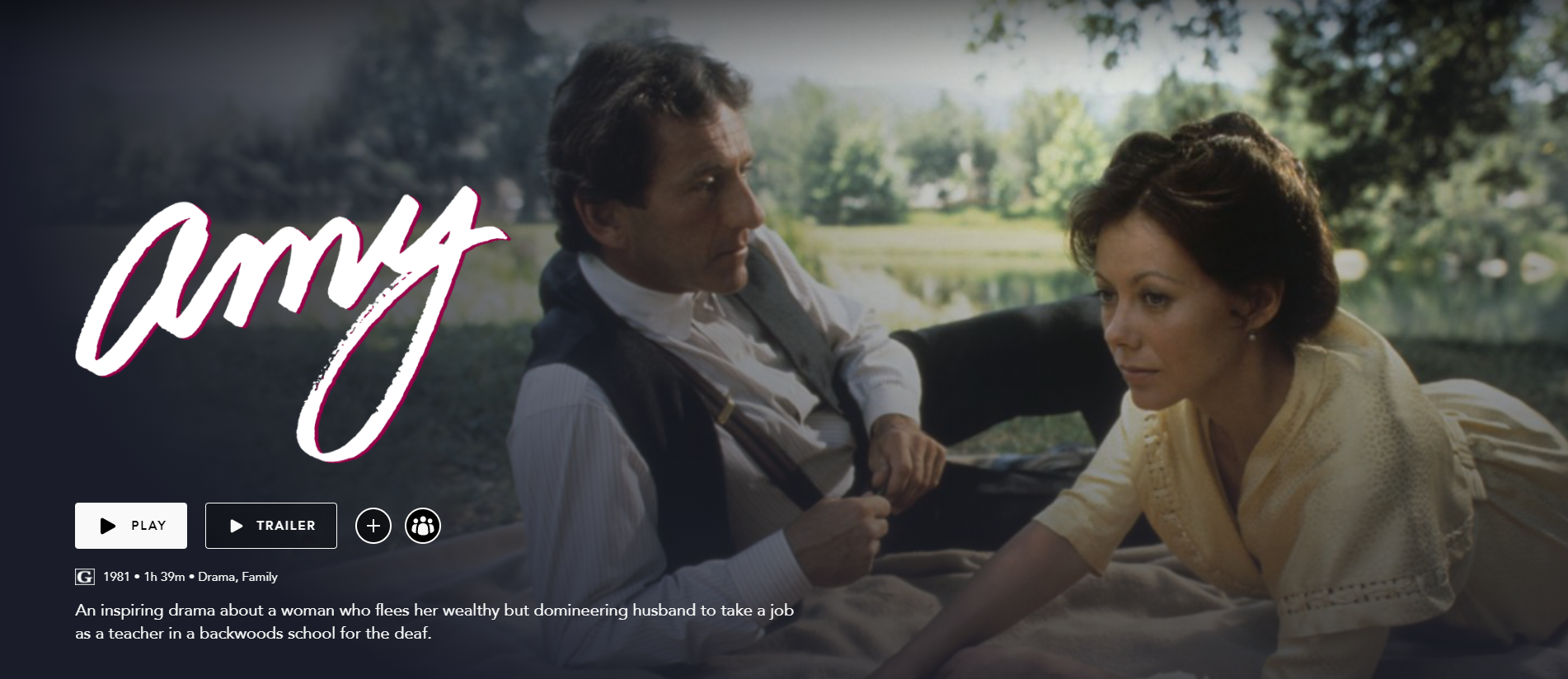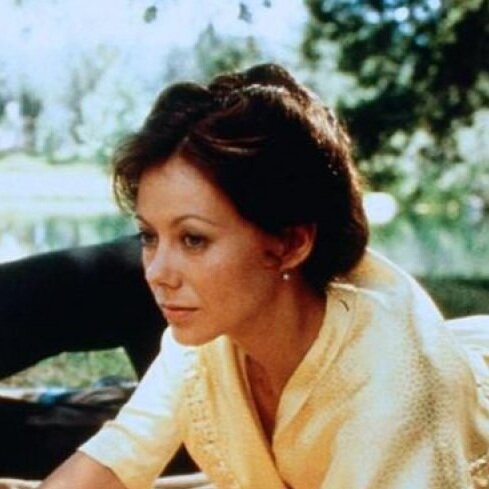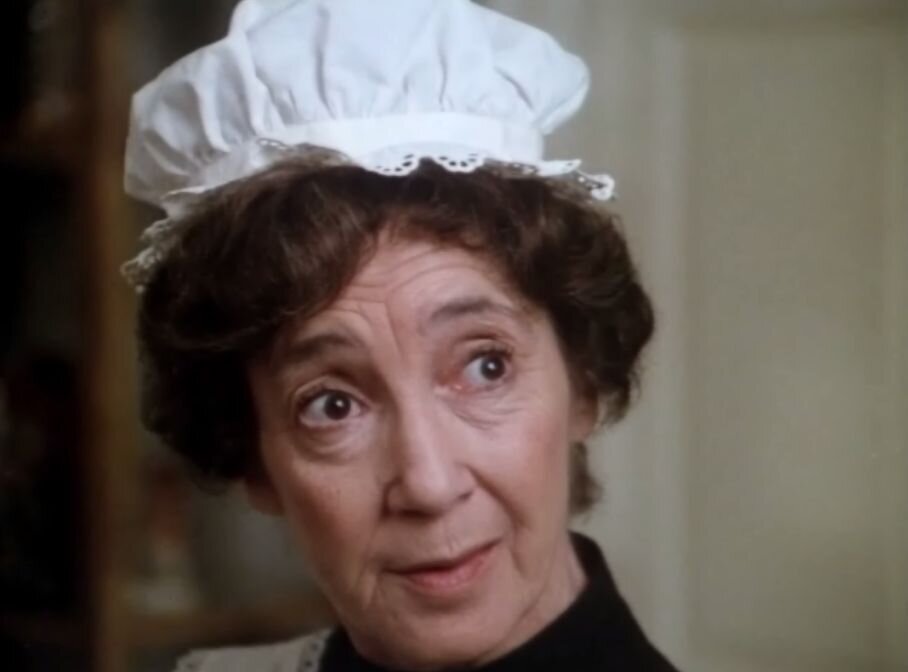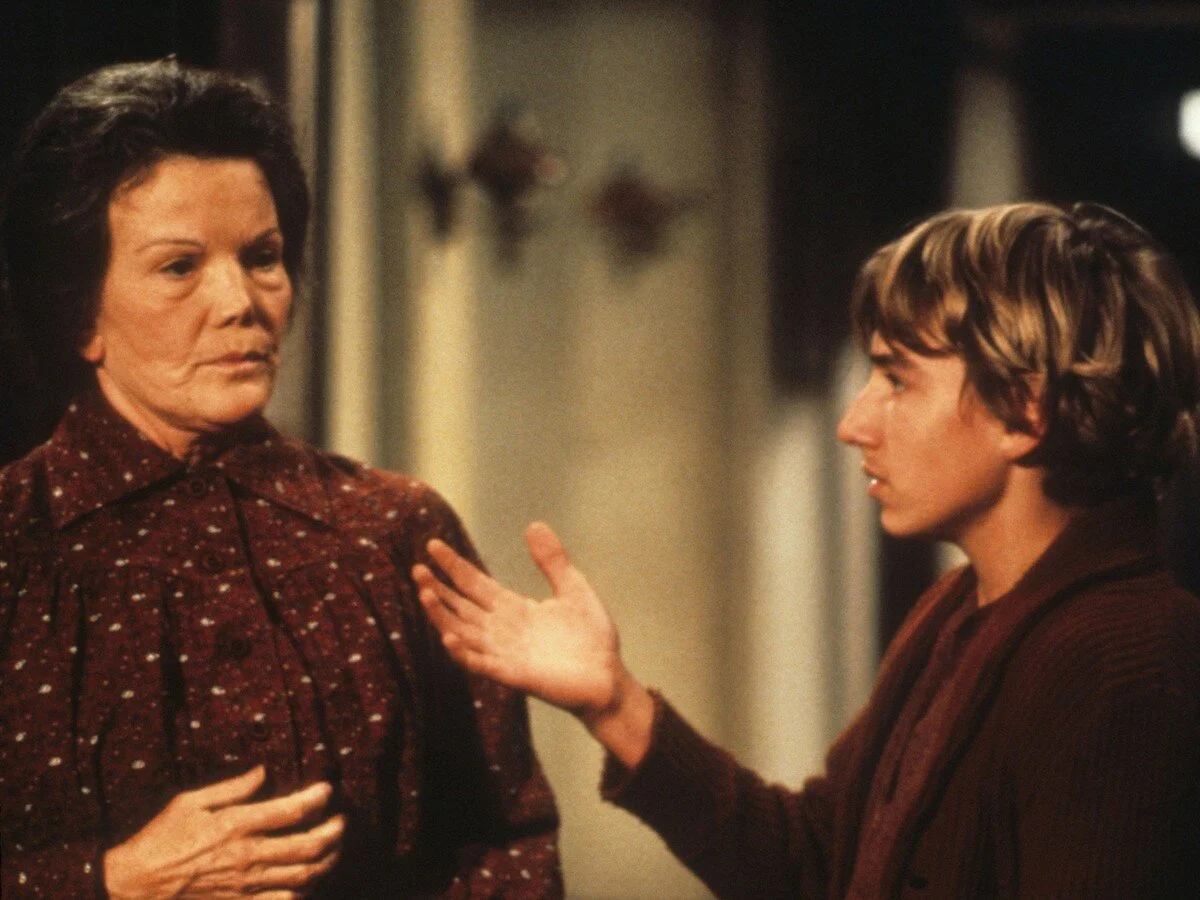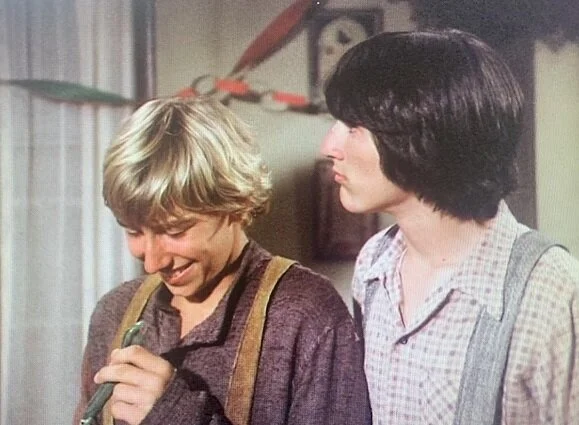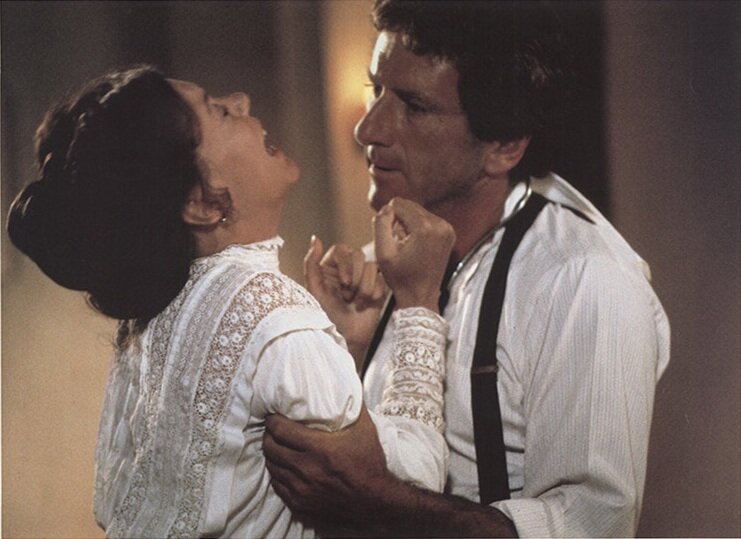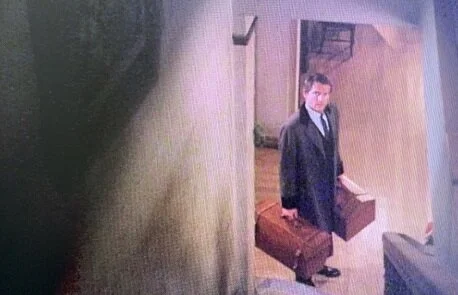Review: Amy (DMC #73)
We might only be two films into Disney’s 1980s movies, but my what a difference it makes compared to the dull 1970s! Last night we watched Amy, a film from 1981 which marks the 73rd film in our Disnerd Movie Challenge! If you’ve never seen this film before, we cover the gist of it in our synopsis below, but if you watched with us, skip ahead to our review!
Synopsis
(Brace yourselves—this one is a bit long.)
As the film opens, Amy Medford leaves behind her wedding ring with a note before grabbing her suitcases and leaving her former home. She soon arrives at the Parker School for the Deaf and Blind where she is shown to her room. She begins to unpack and places a framed portrait into a drawer. Later, the school’s superintendent, Lyle Ferguson, gives Amy a tour of the school grounds and tells her about the students she’ll be teaching as the new speech teacher. The school’s blind and deaf children don’t get along with each other, as evidenced when a couple of deaf boys play a prank on two blind boys. A deaf boy, Henry Watkins, witnesses the bullying and intervenes, punching the bullies in defense of the blind children until the groundskeeper, Clyde Pruett, breaks up the fight. Lyle introduces Amy to Henry, whose name sign is “H on the eyes.” Amy doesn’t understand sign language so Lyle translates Henry’s suggestion for Amy to see Owen Corner, the woodworking instructor, to get her name sign. At the woodworking shop, Owen gives Amy her name sign, “A on the lips,” because she’s the speech teacher. Henry says for him it will always be “A pretty.” At dinner, Amy meets some of the other women on the staff: Helen Gibbs and Malvina Dodd. She shares with them that this is her first real teaching job, formerly she was somewhat of an assistant. Though Malvina tries to take a swipe at Amy for wanting to teach deaf children how to speak—something that the staff finds unthinkable—Lyle comes to her aid to reassure her that they aren’t expecting miracles. The next day, Amy teaches her first lesson with Malvina acting as a sign language interpreter for the class of deaf students. When one of the students, Eugene, violently refuses to let Amy touch his hand to her face so he can feel the vibrations, Malvina merely watches the chaos unfold, only coming to Amy’s aid after Helen steps in and makes Malvina help. Later, Helen tells Amy that Malvina doesn’t like her because she worries that if the deaf children learn to speak there won’t be any need for her to teach them sign language, and she fears that telling the children they’ll be able to speak is giving them false hope. Helen introduces Amy to a boy named Wesley who’s blind, yet he believes he was born with his eyes shut and that one day they’ll open, just like a baby animal. No one has had the heart to correct him, though Amy feels someone should tell him the truth. Back in her room, Amy pulls out the photo she hid away—it’s a photo of a little boy, her son. Meanwhile, Amy’s husband, Elliot Medford, has hired a private investigator to track down Amy, whom he describes as delicate.
During Amy’s next lesson, Amy tells Malvina to stop signing for the students, otherwise they’ll never learn. Malvina angrily storms out. Later, Amy stops by Helen’s classroom where she’s teaching spelling to a class of blind students. One student, Walter Ray, isn’t feeling well, so Amy volunteers to take him to the nurse’s office along with Just George, Walter Ray’s constant companion. Though Amy wants to fetch the doctor, the nurse, Hazel, informs Amy that there’s no doctor at the school. Amy goes to Lyle who regretfully informs her the school lacks funding for a full-time doctor, among other things. Amy runs outside to Clyde Pruett to ask him to fetch the nearest doctor. As they wait for the doctor, Amy entertains Walter Ray and Just George with a story about a prince who had to wear an eye patch over one eye until he learned to care about other people and perform good deeds. The doctor, Ben Corcoran, arrives—drunk! Amy tries to tell him he should sober up by suggesting he have some coffee, but the doctor kicks Amy out of the room. Amy goes out front to wait, watching Henry and the other children clamoring around the doctor’s motorcar. The doctor steps out moments later to say that Walter Ray just ate too many green apples the night before and is going to be fine. He invites the children to hop into his car to go for a ride. Though Malvina rushes out to tell the doctor he’s not allowed to take the children off the premises, the doctor charmingly explains that since he doesn’t work there he doesn’t know the rules as he drives off with the happy kids. Later, while Amy and Helen are working in the storage room, Helen asks Amy if she ever gets lonely being out here when a woman like her could have married any man. Amy reveals that she did marry the first rich man who asked her, but she wasn’t happy. He yelled at her every day for ten years, and she eventually realized she couldn’t keep apologizing for the things she wanted. Her husband doesn’t know where she is, and that’s how she intends to keep it. The next day, Amy takes her students kite flying to teach them the word “kite.” Ben stops by, wanting to see Amy, but she tells him to go away. Meanwhile, the Medfords’ maid refuses to give the investigator any information on Amy’s whereabouts, instead revealing to him that Elliot was a perfectionist who got angry when things weren’t done his way, while Amy was a kind soul who was devoted to her deaf son, taking him to a “special school” every day. His death shattered her. The investigator remarks that Elliot never mentioned a child.
As Amy and Henry pull the kite out of the tree, Henry learns to say “kite” and Amy hurries him to Lyle’s office to celebrate the small victory, though Malvina is surly about it. On her way out of the office, Amy encounters Walter Ray and Just George who are wearing eye patches on their ears. Just like the prince in Amy’s story, they’re going to wear patches over their ears until they do a good deed. Mr. Caruthers, a member of the state board, comes to check in on the speech program and is disappointed when Lyle tells him that only one child can say one word. Malvina tells Mr. Caruthers she thinks the whole program is a waste of money, and Mr. Caruthers tells Lyle he wants a full, uncensored report on the program. That night at dinner, Amy notices Helen isn’t there and learns that one of Helen’s students has taken ill. Amy leaves dinner to go check on Helen and her student. The doctor, Ben, is already there and reports that the student, Wesley, is gravely ill with rheumatic fever. Wesley is days away from his 5th birthday and tells the adults that he can’t wait for his eyes to open on his birthday. Meanwhile, the private investigator visits the school where Amy used to take her son and volunteer. He also learns that Amy’s son would have fainting episodes where his lips turned blue. Back in the infirmary, Amy has fallen asleep at Wesley’s bedside and cries out from a nightmare before Ben wakes her. Though they continue to do everything they can to treat Wesley’s fever, the doctor laments the difficulty of fighting diseases they can’t see or understand. Upon realizing that the boy has died, Ben sends Amy out of the room. It’s only when Hazel comes to find Amy that Amy realizes Wesley has died. She runs back to the infirmary, distraught. Ben holds her as she cries, and Amy confesses that she had a child who was deaf and born with a heart defect. Her husband sent their son away to an institution, and after her son died, Amy never had another child because her husband believed she wasn’t capable of having a normal child. Ben clearly disagrees with the assessment as he continues to console her.
Though the school doesn’t take on students older than 16, Lyle is too kind to turn away a deaf 19-year-old giant of a boy, Mervin, whose father begs Lyle to take on as a student. Mervin is assigned to Amy’s class. Meanwhile, the private investigator tells Elliot what he’s learned about Amy volunteering at their son’s former school. He suspects perhaps Amy might have decided to pursue the same kind of work elsewhere and has his team start combing all local newspapers. Back at the school, Henry gets a letter telling him that his parents will be visiting, and Henry asks Amy to teach him how to say the word “mother.” Amy happily begins teaching him. The following Sunday, Ben picks up Amy and her students for a picnic and Henry becomes fascinated with a group of kids playing football. Ben and Clyde teach the deaf students how to play, which gives Lyle an idea. He challenges Virgil Goodloe, head of the local public school, to a football match between his deaf students and Virgil’s students. At the game, the deaf students win (thanks to their secret weapon, Mervin) and their victory is photographed for the local newspaper…which is discovered by the private investigator and shown to Elliot. Meanwhile, Ben invites Amy to dinner with him and they have a cozy fireside date. Amy tells Ben she has a husband, but Ben says it doesn’t matter. He tells Amy she can’t keep running from her true feelings forever. Amy gives in to her feelings and the two kiss each other. Amy is about to leave, but instead decides to stay. The next day, Henry’s parents arrive and Henry, in front of Malvina and Lyle, happily says “mother” for his overjoyed blind mother and his father. Lyle fetches Amy to come see the power of her work—this is why Henry had such a strong connection with the blind children. Later, Lyle meets with the state board who threaten to cut funding because of the football game stunt, but Amy interrupts the meeting to demonstrate that Henry can speak in full sentences. The members of the board are put in their place.
Back in Amy’s classroom, Eugene has been bullying Mervin, and Henry comes to Mervin’s aid. Ben takes Amy for a driving lesson, after which he professes his love for Amy, and she admits she loves him, too. However, the happiness is short-lived because Amy is soon summoned to Lyle’s office—he received a letter from a private investigator saying Amy’s husband is looking for her. Amy admits she forged the letter of recommendation to get her this job. Lyle says they can’t afford a scandal and suggests Amy reason with her husband, but Amy knows he wouldn’t listen—she was nothing but an object to him. While the students decorate for Christmas, Amy goes into a storage room to fetch the angel for the top of the tree, but she drops it and it shatters, and Amy cries, though her tears are more about grief over her son. Just George overhears Amy crying and comes to comfort her, and Amy thanks him for making her smile, saying he can remove the patch from his ear because he’s done his good deed. However, Eugene again picks a fight with Mervin. Henry attacks Eugene, and Amy intervenes to break up the fight. Mervin begins carving a gift for Henry, Amy gifts her son’s old checker board to Henry, and Ben (dressed as Santa) reads a poem for Amy as a gift. At the Christmas concert, Mervin gives a wooden snake he carved to Henry, but Eugene stomps on the snake, destroying it. Mervin has finally had enough and punches Eugene, then runs away in fear and shame for the harm he’s caused. Henry chases after Mervin. Elliot arrives at the school, and though Malvina lies to protect Amy, Amy unfortunately reveals herself to Elliot. Elliot is angry with Amy for making him the subject of gossip, and he starts packing Amy’s things, despite her protests. Malvina interrupts to say Henry and Mervin are missing. The staff speculate that Mervin might try to run home along the train tracks—but both deaf boys wouldn’t hear the train coming. As predicted, Henry and Mervin are surprised by the train. Though Henry manages to dodge the oncoming train, Mervin is tragically killed. Amy is defeated by yet another child’s death and doesn’t want to feel helpless anymore, but when Henry speaks to Mervin’s parents to tell them Mervin was his friend, Mervin’s parents entrust their daughter, Pearl, with the school, asking Amy to teach Pearl to speak like Henry does. Back at the school, Elliot has packed Amy’s bags, but Amy tells him she won’t be going with him. She won’t allow him to push her around anymore. Though Elliot tells Amy she belongs to him, she corrects him—she belongs to herself. Elliot leaves Amy’s bags behind and walks out the door.
Thoughts Before Watching
Megan: I’m going in with close to a blank slate here. I’ve never even heard of this film before, so I don’t really know what to expect. From the description on Disney Plus, it sounds like this could be almost like a Helen Keller story, but from the point of view of the teacher. I guess we’ll find out!
Kevin: My thoughts exactly; this seems to be similar to the story of Hellen Keller. Well, whatever it’s about, I’m curious to see how it differs compared to some of the last few live-action movies we’ve watched. Between absurd, bogus, and sometimes dreary sci-fi, and some mediocre comedy, I’m looking forward to something like this. A drama might be just the right kind of genre to break up the monotony of the last month or so. Honestly, I have a feeling this may be rather wholesome.
Thoughts After Watching
“OMG, it’s Sister Jullienne!”
Megan: I just have to take a moment to fangirl over the star of this film, Jenny Agutter! I know her as Sister Julienne on Call the Midwife, and the entire time I was watching Amy I kept thinking there was something incredibly familiar about this woman and the way she spoke. Did I know her from an earlier film? From something newer? It wasn’t until after the movie was over that Kevin and I looked up the cast on IMDb and realized that OMG! Amy was indeed played by a younger Jenny Agutter! (Another fun fact: she also played roles in The Avengers and Captain America: The Winter Soldier.) Props to her for being such a good actress that I had a hard time recognizing her from other roles!
Kevin: I haven’t seen Call the Midwife yet, and though I didn’t recognize Jenny Agutter at first, all it took was Megan mentioning that her credits included The Avengers and Captain America: The Winter Soldier for me to immediately realize who she was! Which, honestly, is amazing because she has only a small role in both films. Maybe I’ve just seen those movies enough times at this point, or perhaps she just has that much presence on film! I will say that I enjoyed her performance in Amy so much that I really should give Call the Midwife a try very soon here.
A strong cast!
Kevin: While I admit I had to look up IMDb to get the names of a lot of the film’s cast, I was prompted to do so because there were so many familiar faces. I knew I must have seen some of these folks before and just didn’t know where. We already mentioned Jenny Agutter, but there were several other notable cast with her. Kathleen Nolan (as Helen) is featured prominently in the film. Outside this film, her work includes credits in several television series, including Ally McBeal, Murder, She Wrote, Crossing Jordan, The Bionic Woman, and Gunsmoke. In addition, she originated the role of Wendy Darling in the Broadway production of Peter Pan, which is probably my most favorite Broadway musical. Oh, and did I mention she was also the first woman to serve as president of the Screen Actors Guild? Nolan has certainly made a name for herself! Amy also features several other actors of renown from this age, and many who were cast in a lot of the same shows (though not necessarily the same episodes). This includes Margaret O’Brien, Nanette Fabray, Barry Newman, Chris Robinson, and Lou Fant. In particular, I was pleased to discover that Fant, who was completely fluent in both English and American Sign Language, had many roles that were focused on sign language and the deaf. Actually, from what I could research, it appears that all the deaf children in the movie were played by actors who were deaf in real life, including Otto Rechenberg as Henry and Alban Branton as Eugene. I was concerned that the film would cast hearing children, so I’m glad that they didn’t. Not only did it give the film some authenticity, but since film studios have often cast non-disabled actors as disabled characters, it’s good to see that the filmmakers of Amy opted not to do that.
Strong Feminist Themes!
Megan: After so many Bechdel test fails amid Disney’s 1970s films, I was ecstatic to find that Amy not only passed the Bechdel test right out the gate (and continued to pass it throughout the film), but that the film’s very concept supports strong feminist themes! We’ve got a woman who leaves her sexist husband, pursues a career that gives her a sense of purpose, and ultimately frees herself to live the life she desires. Even better? When she finally finds a man who respects her as an equal partner in the relationship, that love story does not overshadow Amy’s real victories of ridding herself of her emotionally abusive husband and doing what no one thought possible—teaching deaf students to speak. Yes, yes, and yes! Extra bonus? We get to see women supporting women! (More on that later.) I think the film’s feminist themes are in large part thanks to the female screenwriter responsible for this film: Noreen Stone. According to IMDb, Amy was Noreen’s first feature film project (or at least the first one that made it through production), and I’d just like to take a moment to congratulate her on getting a film with these feminist themes made during this era, and for those themes surviving the production process with a largely male filmmaking team. What a feat!
Women Supporting Women
Megan: One of the pitfalls of many films about women created by men is to have female characters fighting amongst themselves or tearing each other down. I was so relieved this wasn’t so with Amy! Amy instead is surrounded by a support network of women—whether she’s aware of it or not! There’s the obvious supportive relationship, of course, between Amy and Helen. Amy helps out Helen by escorting Helen’s students to the infirmary and going to Helen’s side when one of her students (Wesley) falls gravely ill. In turn, Helen supports Amy by listening to her and sharing intel about this new job Amy is navigating (like why Malvina seems to be against Amy at first). Then there’s the support network that Amy is less aware of. The maid who worked for Amy and Elliot continues to defend Amy even after Amy left by refusing to give the private investigator any information about Amy’s whereabouts. Though her words do inspire the investigator to pursue a different path of inquiry, she only has good things to say about Amy, and we get the sense that she supports Amy’s decision to leave such a “perfectionist” (ahem, controlling) husband. Though the film initially pits Malvina against Amy, this is a far more nuanced rivalry than most films choose to display between two women. The root cause of this rivalry (thankfully) has nothing to do with a man—it’s all about job security and perhaps a small dose of overprotectiveness. Malvina, the sign language teacher, is worried that by teaching deaf children to speak, there will be no use for her. She’s also worried that Amy is promising the impossible and will only disappoint the deaf children by promising them something Malvina believes they can never achieve. Though we in the audience are meant to see Malvina as a hurdle for Amy, Malvina does have some valid concerns, even if her actions against Amy could have been kinder. Because Malvina’s initial concerns are valid, it makes her eventual transformation all the more powerful when she witnesses the power of Henry’s ability to speak to his blind mother. Later, when Malvina finally learns that Amy ran away from an unloving husband, we see the change in Malvina. Though Amy expects Malvina to scold her for forging her way into this teaching position, we in the audience get the sense that Malvina was going to say something far more sympathetic, if Amy had let her. That’s why Malvina lies to Elliot when he comes to the school. Malvina has come to see the value not just in what Amy is teaching her students, but in Amy herself, and she doesn’t want to see Elliot cause Amy any further distress. Though Malvina’s effort to defend Amy fails because Amy walks into the entryway, it is still a strong effort, and we love her for it. We know that long after Elliot leaves, Amy and Malvina will have a stronger, more supportive working relationship, and perhaps, dare I say it, a friendship.
The real villain here is sexism
Megan: Given the time period of the film, there is, of course, plenty of sexism that Amy is up against. Her husband, her primary antagonist, is the embodiment of sexism in the film. When asked by the private investigator to describe his wife, the first thing Elliot says is “She’s delicate, really. She often took to bed, like most women, I suspect. She’s not the sort that would do things for herself. She depended on me.” Okay, dude, I get that you feel more like a man if a woman is dependent upon you, but most women can do plenty for themselves, if you let them, and they don’t take to bed often unless they are ill or depressed. (Although, given what life was like for most women in the early 20th century, it’s quite possible that loads of women were depressed and taking to bed because they had no other way to deal with the constraints society and their husbands put upon them.) His assumption that she was merely delicate and not incredibly unhappy after the loss of a child (which he failed to tell the investigator about) shows how little he really cared about her well-being. He didn’t even notice she was unhappy!
PRIVATE INVESTIGATOR: Was she happy?
ELLIOT MEDFORD: Of course. I gave her everything.
First of all, giving her “everything” is not the same as making her happy. I could get it if he felt ill-equipped to help Amy through her grief and depression after losing a child, but how could he live with his wife and not realize she was unhappy?! I wish I could say that this line was him putting on a mask of masculinity in front of another man to prove that he was doing his duty as a husband, but given how he goes on throughout the rest of the film, I think he truly was blind and deaf to Amy’s needs and desires. When we eventually hear what things were like from Amy’s perspective, it’s a far different story:
HELEN: If I had your looks, I’d have married the first rich man who asked me.
AMY: I did. Marriage doesn’t take away from loneliness. I was lonelier there than here.
HELEN: You weren’t happy?
AMY: Do you know, for all the years we were married, my husband complained because I left the cap off the tooth powder. He must have yelled at me every day for ten years, and I kept apologizing and forgetting. Do you know, it’s only occurred to me since I’ve been here that I could have had my very own tooth powder.
HELEN: Why’d you marry him?
AMY: I don’t know. There was something about him. A kind of brilliance, I think. He always did what he set out to do. He could always make me do whatever he wanted. I could never say no to him.
HELEN: What happened?
AMY: I realized that I was always apologizing for things that I wanted, and I just couldn’t do that anymore, so I left.
Not only was Amy unhappy, but she might as well have been a prisoner with the way Elliot treated her. What’s more, it seems he was a terrible father. He practically disowned his son upon learning he was deaf and had a heart defect, and when his son died, it seems he didn’t allow himself to grieve or share that grief with Amy. Instead, he blamed her, and refused to have any more children with her because he believed she was incapable of having “normal” children. Is it any wonder Amy left him? As she says herself:
AMY: He never listened to me. […] I was just something that he owned, like a painting or a stamp collection. A useless ornament. And he wanted me that way because it made him feel like more of a man.
The reason I’m quoting things like crazy here is because this is the first time in this challenge that we’ve seen a female character articulate just how horrible it is to be constrained into such a tiny box of what a woman is expected to be, and how a man who only desires a cardboard cutout of a wife instead of a real human being with needs and aspirations is a man to be despised, not celebrated.
Kevin: I couldn’t agree more with all of this. Though Elliot is the main source of sexism in the film, the state board has its share, too. I wanted to call attention to just how satisfying it was when Amy went directly to the state board to show them Henry could speak. How wonderful was it when that board member shut up and sat down after hearing Henry talk? When you consider that just moments earlier the board member, Caruthers, was threatening to pull funding and being rather aggressive to Amy, his look of utter shock was satisfying. What was even funnier was that right after Henry spoke, Megan and I both thought “you can sit down now” in regards to Caruthers. We weren’t using it literally, but instead more as a metaphor. Seconds later, Caruthers did indeed sit down, and the two of us immediately cracked up! Now THAT is how to deal with people who believe your cause is pointless!
Even marginalized folks can be bullies
Kevin: Another antagonist in the film is marginalization. I thought one of the most interesting (not the same thing as “good”) plot threads the movie had to offer was the bullying that other students inflicted on others. Interestingly, all the bullying comes from deaf children. Although Amy is centered primarily on deaf children, the story shows that Amy cares for the well-being of all the children, including the ones who are blind. In spite of the film focusing more particularly on one disability, it’s the group of deaf children who exhibit the bullying tendencies. We first see this near the beginning of the film when a couple of deaf children knock down two blind boys. This scene is also used to set up Henry Watkins’ character; though deaf himself, Henry shows he isn’t willing to put up with bullying from anyone, no matter who they are. Of course, we later discover that Henry has a strong connection to blind children because his own mother is blind, but that only enhances his traits as a morally good character. Henry chooses not to judge anyone by their disability, but by their behavior instead. This plot thread is at its most noticeable with the character Eugene, played by Alban Branton. (On a side note, Eugene does not appear to be named in the film at all; we racked our brains and even went back to a few scenes to check, and we’re very sure he was never named on screen. It took a bit of internet sleuthing to figure it out!) For reasons that are never explained to Amy or to the audience, Eugene just seems to be a bitter teenager. He is deaf, like Henry and his classmates, but that doesn’t stop him from acting out in awful ways. Eugene’s bullying appears to be reserved solely for Mervin, who by all accounts seems to fit the mold of “gentle giant.” When we first meet Mervin, Eugene silently mocks him to a classmate. Later, Eugene is seen showing the same classmate a grotesque caricature of Mervin. When Henry sees it, he is quick to defend the friendship he has with Mervin and attacks Eugene. The bullying comes to its climax when Eugene breaks a gift Mervin made for Henry. Mervin, having finally had enough, punches Eugene so hard that Eugene bleeds and is apparently knocked out. This chain of events is what ultimately leads to Mervin’s death. I was disappointed that the film didn’t go more into Eugene as a character, and that there were never any real consequences for his actions. Yes, he was punched by Mervin, but Mervin is killed shortly after, and no teacher is ever seen reprimanding Eugene for his bullying. Granted, I realize that Henry and Mervin were quick to always hit Eugene for acting out, so of course the teachers are going to take care of the immediate problem, but it still would have been nice to see Eugene experience some true consequences for his behavior. I also think it was a missed opportunity to not give us some background to help explain why he acts the way he does. Is it because he is deaf? Does he have some feeling of self-loathing? Is he jealous of Henry’s friendship with Mervin? Or is he just supposed to be seen as a “bad kid?” It’s possible the film had no intention of going into Eugene’s character more than they did because they wanted to show that bullies can come from all walks of life, even those groups that are marginalized. Still, though the filmmakers took this plot thread quite far, I think they could have explored it a bit more fully. Actually, this situation reminded me a bit of John Steinbeck’s Of Mice and Men. Both that book and this movie feature a “gentle giant” young man who experiences bullying and ultimately loses his life. I won’t go into too many details, but the similarity really only stops there. The specific circumstances are quite different, but I still thought the similarity was worth noting.
Megan: My only theory as to why Eugene might have bullied Mervin and the other kids is that he may have been abused as a child. The only hint of this is that he refuses to allow Amy to touch him during her first lesson, and he reacts violently at the mere suggestion of her touching him. Of course, Amy then doesn’t help matters by trying to restrain him by touching him. This is the only hint we get into Eugene’s backstory, though. It would make sense if this were true: those who are bullied and abused often become bullies and abusers themselves. However, I wish the film had taken a little more time to show us more of who Eugene was and why he was always acting out. It could have allowed him a redemption arc (at one point I thought for sure that Henry was going to tell Mervin to offer the cookie in his pocket to Eugene instead of Henry, or that Mervin was going to try making a gift for Eugene as a peace offering, but alas, neither came to fruition). At the very least, giving us a little more of Eugene’s backstory might have humanized him. It wouldn’t have excused his behavior, but it would have helped us understand his behavior.
Careful how you introduce your characters…
Megan: If you’ve ever read the screenwriting book Save the Cat, you’re probably familiar with the titular phrase. To “save the cat” in screenwriting is to have a character perform some good deed early on that makes us like them. For instance, in Moana, we see baby Moana help escort a baby turtle safely to the sea after she sees some birds picking on it. The filmmakers behind Amy didn’t quite nail the “save the cat” moment with Ben, in my opinion. The first time we meet him he’s arrived drunk to check on a sick child, which makes him look incompetent and irresponsible. That he then goes to give the kids a fun joyride in his car doesn’t really help us like him. As the story unfolds, we start to see that he isn’t nearly as bad as our first impression, but that first impression still lingers, making it hard for us to fully root for the romance between Ben and Amy. For instance, in the scene where Ben grabs a distraught Amy (see photo above) with the intention of consoling her, the way Ben grabs hold of Amy doesn’t read as consoling—it looks more violent. When Amy stops resisting Ben and allows herself to be held by him, then we see the act as consoling, but it’s hard to be fully invested in the comfort Ben is trying to provide because seconds earlier he seemed to be violently restraining Amy against her will. These moments are subtle, but since this story has set up that Amy just left an emotionally abusive and unavailable husband, we in the audience are on the lookout for any man who might put Amy through the same situation all over again—and Ben has some red flags with the drinking and a weirdly violent way of consoling a woman. Ben isn’t all red flags though. He has some strong qualities that make us like him better in the second half of the film. I like that Ben challenges Amy to seek what she wants, without regard to what anyone else wants—including Ben. I also like that he consoles and reassures Amy in some of her darker moments, and that he’s able to make her smile and relax into herself. However, I’m also glad that the film does not end with Ben and Amy’s relationship. There is no wedding, no proposal, and that’s honestly as it should be. This is the story of how Amy finally started living life on her terms, not her husband’s. Ending the film on her relationship with Ben would have stolen the power away from her final moment of separation from her husband.
A bit too abrupt of an ending, but overall very wholesome.
Kevin: I have very few complaints about this movie. Other than the slight disappointment surrounding the character Eugene, the only other thing I wanted to discuss was the ending, which I thought was just a bit too sudden. Now, I’d like to be clear here that the choice to end the movie with Amy standing up to Elliot was the best and most appropriate way to end the story. Though the story focuses on Amy’s teaching deaf children to speak, what kick-started the plot was Amy walking out of her husband’s life to pursue her goals. Having Amy stand her ground and Elliot walking away is perfect since it nicely bookends the film. What I probably would have done was just try to round out some of the earlier elements and bring a bit more closure. As I already mentioned, I thought the movie could have done better in really addressing Eugene’s bullying. Not only could there have been some consequences, but there could also have been a chance to give him more character than just being a bully. I also thought how many of the characters handled Mervin’s death was a bit odd. There was more emotion in Wesley’s death than there was Mervin’s. Perhaps we’re meant to see Wesley’s death this way because he was so much younger, but doesn’t Mervin deserve the same grief? I was slightly weirded out by the way Mervin’s parents reacted, which is to say I felt they barely did. Don’t get me wrong, I’m glad they recognized Amy’s skills and asked her to teach their daughter, but would loving parents really do that right after having just found out one of your other children was killed? I don’t buy that scene all that well. If we as the audience had time to grieve for Mervin along with his family, Amy, Henry, and Ben, the payoff of having Amy teach their daughter would have had more weight. Instead, Mervin’s death just feels like its brushed aside too quickly.
With all that said, Amy is just so full of wholesomeness that my disagreements with certain parts of the film don’t at all detract from my enjoyment of it. Like I said at the beginning of the post, I was hoping that this would provide a nice change to the very mediocre films we’ve had to slog through the last several weeks. I am VERY glad I was right! For the first time in a while I was engaged with the story and the characters. Amy’s steadfast determination to teach the children how to speak is endearing. Amy and the audience are rewarded with patience when Amy’s lessons begin to pay off and Henry starts to speak. This subsequently leads to the state board who, on the verge of cutting funding to the program, are astounded, and we cheer for Amy proving herself and shutting down the naysayers that told her she couldn’t do it. We root for Henry when he speaks his first words and uses them to talk to his blind mother, allowing both of them to finally communicate in a way they never had. This movie does a great job setting up its characters and giving them proper payoffs, at least for most of them. I would categorize this as something that should be watched at least once. It has a lot of feel-good moments in spite of the colder ending surrounding Mervin’s death. Though I would probably only watch it again if it happened to be on T.V., I’m so glad we finally saw something that I wanted more of instead of less.
